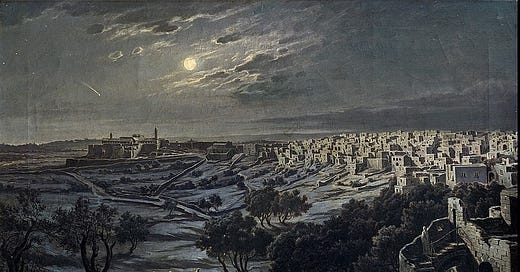One night, when I was five years old, I was walking with my mother down our little dead-end street, and I pointed to a W-shaped constellation in the sky, and said, “There’s Cassiopeia!” My mother was delighted and not entirely surprised. “How did you know about that?” she asked. I told her that I’d read it in the encyclopedia. I was fascinated by the stars — those great balls of fire far away that give us our Word of the Week.
Several years later, my parents bought me a small telescope for Christmas; I am looking at it right now, a few feet away from me in my study. They didn’t know about the stars or about telescopes, but I did manage to use it to look at Venus, Mars, Jupiter, and Saturn with her rings, and many years after, in the summer and fall of 1985, the year when I met my wife Debra, I used it in the parking lot to look at Halley’s Comet, and showed it to Debra too — the most famous comet, a great snowball in the sky.
We don’t know what star the sages from Persia, or from some other star-gazing land to which the Jews had been exiled, were following. Was it an asterism, an unusual conjunction of two or three planets, or of a planet and the moon, such as we saw in the sky a few weeks ago, when Jupiter and the moon were but a few degrees apart? Was it a nova — a new star in its appearing to us, to herald the new king? Was it a comet? Was it some other phenomenon, purely miraculous?
Maybe we will find out, in that New Jerusalem to come, the one where there is no suspicious Herod, the half-Jew and all-tyrant, but rather the Lamb whose light for the city is both sun and moon. The odd thing is that the Jews themselves were not star-gazers. The Torah forbids all attempts to divine the future by looking at the stars. In fact, the sacred author of Genesis goes out of his way, I believe, to poke two fingers in the eyes of the rival Chaldeans, when he adds, as if it were an afterthought, “and He also made the stars.” Yet the Jews were by no means blind to the beauty of the heavens, and there’s an odd figure painted in my boyhood church that testifies to such looking upward. He’s Balaam, of all people, prophet for hire, who said, “I shall see him, but not now: I shall behold him, but not nigh: there shall come a Star out of Jacob, and a scepter shall rise out of Israel.” That star is but a little child in an obscure house in the unconsidered trifle of a village, Bethlehem.
Now that I think of it, the biggest physical thing named in the first chapter of Genesis is the star, and the smallest is the seed, and if you ever saw the Milky Way on a clear and crisp moonless night, you’ve seen those stars broadcast about the heavens like powder, like bright little seeds, and yet a mustard seed, smallest of all the seeds, is an infinitely more beautiful and wondrous thing in its complexity, and its life, and the Kingdom of God finds room enough within it, an endlessness of room.
The word star comes from an ancient Indo-European root, meaning “that which burns” or “that which shines.” The -ter part of it, believe it or not, may be a suffix denoting an agent; we see that suffix’s descendants in English mother, father, daughter. Anyway, it gave us Old English steorra, the granddaddy of our star, and Greek aster (with an intruding initial vowel; think of French ecole from Latin schola), and Welsh seren, and Latin stella, and other cousins in Persian and the Hindu languages and elsewhere. Why is it Latin stella and not sterra? Well, L’s and R’s are what we call liquid consonants, and they’re easy to flip from one to the other, in languages that have both. (A lot of languages have only one: Hawaiian has only L, as does Chinese, but Japanese has only R, which is why Mr. Asano in our last Film of the Week found lollipop so hard to pronounce!). Stella took the sound from R to L, but it can go the other way too: Latin ecclesia, church, became Portuguese igreja.
May the true Star of Jacob light the way for you and all your loved ones!
Word & Song is an online magazine devoted to reclaiming the good, the beautiful, and the true. We publish six essays each week, on words, classic hymn, poems, films, and popular songs, as well a weekly podcast, alternately Poetry Aloud or Anthony Esolen Speaks. To support this project, please join us as a free or paid subscriber.














Share this post